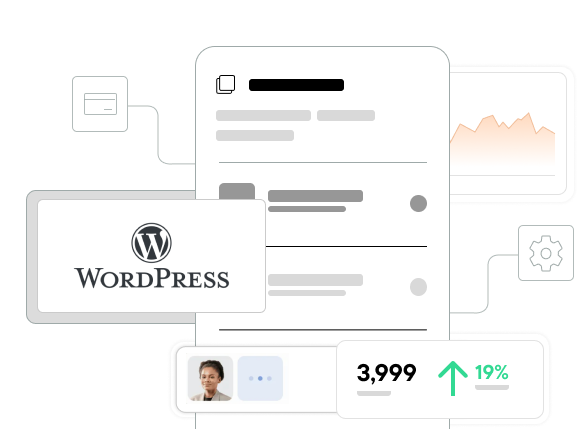Why Static Sites Don’t Cut It Anymore
In today’s fast-moving web landscape, users expect content that feels made for them. Static pages are outdated – visitors now demand relevance. That’s where real-time personalization in WordPress steps in, letting you tailor content based on user behavior and engagement patterns.
Understanding the Foundations of Real-Time Personalization
Behavioral Data: The Digital Footprint of Your Visitors
Every click, scroll, and pause tells a story. Behavioral data includes actions like:
- Time spent on page
- Clicked buttons or banners
- Entry and exit paths
- Scroll percentage
- Referrer and device type
This data reveals what users want – so you can show them more of it.
Cookies: Your Lightweight Memory Layer
Cookies help you remember visitors between page loads or even days apart. For personalization, you can use cookies to:
- Store user engagement flags
- Track interests across sessions
- Serve returning visitors customized content
Prefer short, readable values like clicked_offer=true instead of bloated payloads.
Why WordPress Is a Perfect Base for Personalization
While WordPress doesn’t offer personalization out of the box, it’s highly extendable. You can layer in:
- PHP logic inside templates
- JavaScript for real-time behavior tracking
- REST API endpoints for dynamic data in headless setups
It works for blogs, product pages, campaign microsites—you name it.
How to Capture and Use Behavioral Data in Real Time
Tracking Engagement Events with JavaScript
Use JavaScript to track specific behaviors, then set flags via cookies. Example: scroll tracking.
window.addEventListener('scroll', () => {
if (window.scrollY > 800) {
document.cookie = "scrolled=true; path=/; max-age=86400";
}
});Expand this to clicks, video plays, or time on site.
Rendering Smart Content with PHP Based on Cookie Values
In your theme, use cookie values to show targeted messages:
if ($_COOKIE['scrolled'] ?? false) {
echo '<div class="promo-banner">Thanks for scrolling! Check this out.</div>';
}You can also include this logic in widgets or shortcodes.
Creating User Segments from Behavior Flags
Combine cookies for more advanced segmentation:
- Scrolled + Time on Page = “Highly Engaged”
- Clicked CTA = “Interested in Offer”
- Visited 3+ pages = “Browsing User”
Tailor your CTAs, headlines, or product suggestions based on segment.
Dynamic Personalization with the WordPress REST API
For JavaScript-heavy or headless sites, use REST endpoints:
add_action('rest_api_init', function () {
register_rest_route('personalize/v1', '/content', [
'methods' => 'GET',
'callback' => 'get_personalized_content'
]);
});
function get_personalized_content() {
$message = 'Welcome!';
if ($_COOKIE['scrolled'] ?? false) {
$message = 'Thanks for exploring — here’s something new!';
}
return ['message' => $message];
}This makes personalization available across frontend frameworks like React or Vue.
Practical Code Examples for Common Personalization Needs
Set a Cookie When a User Interacts
document.querySelector('#signup-btn').addEventListener('click', () => {
document.cookie = "interested_signup=true; path=/; max-age=604800";
});Display Custom CTA for Engaged Users
if ($_COOKIE['interested_signup'] ?? false) {
echo '<div class="signup-box">Looks like you’re interested — sign up now!</div>';
}Add Personalized Messages Using Shortcodes
function personalized_message_shortcode() {
return ($_COOKIE['scrolled'] ?? false)
? 'Welcome back, explorer!'
: 'Hi there! Scroll to uncover more.';
}
add_shortcode('personalized_greeting', 'personalized_message_shortcode');Place [personalized_greeting] anywhere in a post or page.
Smart Tips for Building Scalable, Privacy-Respecting Personalization
✅ Respect Privacy and Compliance Standards
- Use cookie consent tools (e.g., Complianz, CookieYes)
- Avoid sensitive data in cookies
- Always offer opt-outs
✅ Prepare for Cookie-Free Sessions
Not everyone allows cookies. Always offer a fallback or default experience if:
- Cookies are disabled
- JavaScript is blocked
- It’s a first-time visitor
✅ Optimize Cookie Usage for Performance
Use small, simple cookie values like:
scrolled=true; clicked_offer=trueAvoid bloated or sensitive information.
✅ Test Across All Browsers and Devices
Simulate various conditions:
- Incognito or private mode
- With and without cookies
- With ad blockers on
Use browser DevTools and cookie inspection tools for QA.
Final Thoughts: Personalization That Converts Starts with WordPress
Real-time personalization in WordPress doesn’t have to be complex. With a few lines of code, you can create an experience that feels tailored to each visitor—boosting engagement, conversions, and user satisfaction.
Whether you’re personalizing blog intros, eCommerce CTAs, or lead-gen forms, WordPress gives you the flexibility to do it all—your way.
Supercharge Personalization with Sitebox
If you’d rather skip the manual coding, Sitebox delivers turnkey personalization features that plug directly into your WordPress setup:
- 🎯 Behavior-based rules baked into templates
- 🍪 Smart cookie segmentation without coding
- 🧩 Visual UI for creating dynamic campaigns
- ⚡ Instant-load personalized content
- 🧪 Built-in A/B testing, UTM tracking, and analytics
Run hundreds of campaigns across one or more sites—without managing complex infrastructure.
👉 Explore Sitebox for real-time personalization in WordPress




